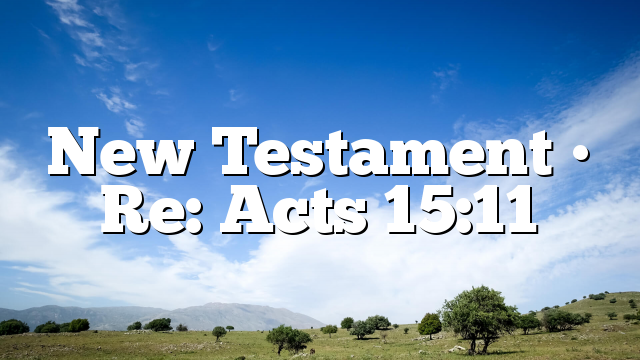Dmitriy Reznik wrote:
timothy_p_mcmahon wrote:While hendiadys makes reasonable sense, I’m wondering about the use of the article with both nouns.
I found the answer to this in Blass and Debrunner, where there are examples of hendiadys with the article with both nouns:
James 5:10:
τῆς κακοπαθείας καὶ τῆς μακροθυμίας (of perseverance in suffering)
Luke 2:47:
ἐπὶ τῇ συνέσει καὶ ταῖς ἀποκρίσεσιν αὐτοῦ (at his intelligent answers)
Mk 6:26 = Mt 14:9:
διὰ δὲ τοὺς ὅρκους καὶ τοὺς συνανακειμένους (because of the oath taken before the guests)
Also, I found that a famous medieval Jewish commentator Rashi understood חֶסֶד וֶאֱמֶת (lovingkindness and truth) as hendiadys (חסד של אמת, i.e. true lovingkindness)!!
(http://parsha.blogspot.com/2010/12/is-% … iadys.html)
Thank you again,
Dmitriy
P.S. Maybe somebody would like to add something to our discussion?
Thanks.
You must be refrring to Blass, Debrunner here:
§442 (16) The co-ordination of two ideas, one of which is dependent on the other (hendiadys), serves in the NT to avoid a series of dependent genitives
They do suggest translations like “perseverance in suffering” for James 5:10 and “intelligent answers” in Luke 2:47, but I don’t think this is the best or only way of interpreting them.
James 5:10 could as well be understood as the unjust suffering the prophets had to endure and their perseverance in spite of those sufferings. Of course, the two ideas are closely connected and overlapping in time, but is one dependent on the other? I usually think of hendiadys as two nouns where one describes the other and therefore one may be translated by an adjective. There is a tendency to look at the sense of καὶ from an English perspective which sees the two nouns as more distinct than they were intended. Two nouns joined by καὶ are often overlapping in sense, reference or time. It may well be more natural and clear in English to say “patience in the face of suffering” (NIV) than “suffering affliction and of patience” (KJV) or “suffering and patience” (NET).
In Luke 2:47 I am not sure it is accurate to reduce “his understanding and his answers” to “his intelligent answers”, because the previous verse says that Jesus was listening to them and asking questions. I think rather Luke is talking about his insightful questions and his excellent answers to their questions. A Rabbinic dialogue was often in the form of questions and counter-questions in addition to answers.
I have similar hesitation for Mk 6:26. The king could not retract for two reasons: He had made an oath, so he might fear God if he went against it. It would be dangerous. He had made it in public so he would fear the reaction of the guests. It would be shameful.
Nor would I consider it likely that a hendiadys is intended in John 1:17.
ὅτι ὁ νόμος διὰ Μωϋσέως ἐδόθη, ἡ χάρις καὶ ἡ ἀλήθεια διὰ Ἰησοῦ Χριστοῦ ἐγένετο.
There are 3 pairs of lexical contrasts/comparisons:
ὁ νόμος — ἡ χάρις καὶ ἡ ἀλήθεια
διὰ Μωϋσέως — διὰ Ἰησοῦ Χριστοῦ
ἐδόθη — ἐγένετο
The initial ὅτι probably explains the previous χάριν ἀντὶ χάριτος (grace instead of grace). The two words grace and truth also pick up on the same two words in verse 14:
καὶ ἐθεασάμεθα τὴν δόξαν αὐτοῦ, δόξαν ὡς μονογενοῦς παρὰ πατρός, πλήρης χάριτος καὶ ἀληθείας.
It seems to me that John is talking about a new and fuller expression of the grace and truth from God which came with Jesus and goes far beyond what was given through Moses. It does not mean that there was no grace or truth in the Torah, but there is a fuller reality of grace and truth through Jesus. So, I think grace and truth are best kept separate rather than trying to make them graceful truth or truthful grace. If there is a true grace, is there also a false grace?
Statistics: Posted by Iver Larsen — July 2nd, 2014, 3:17 am
















